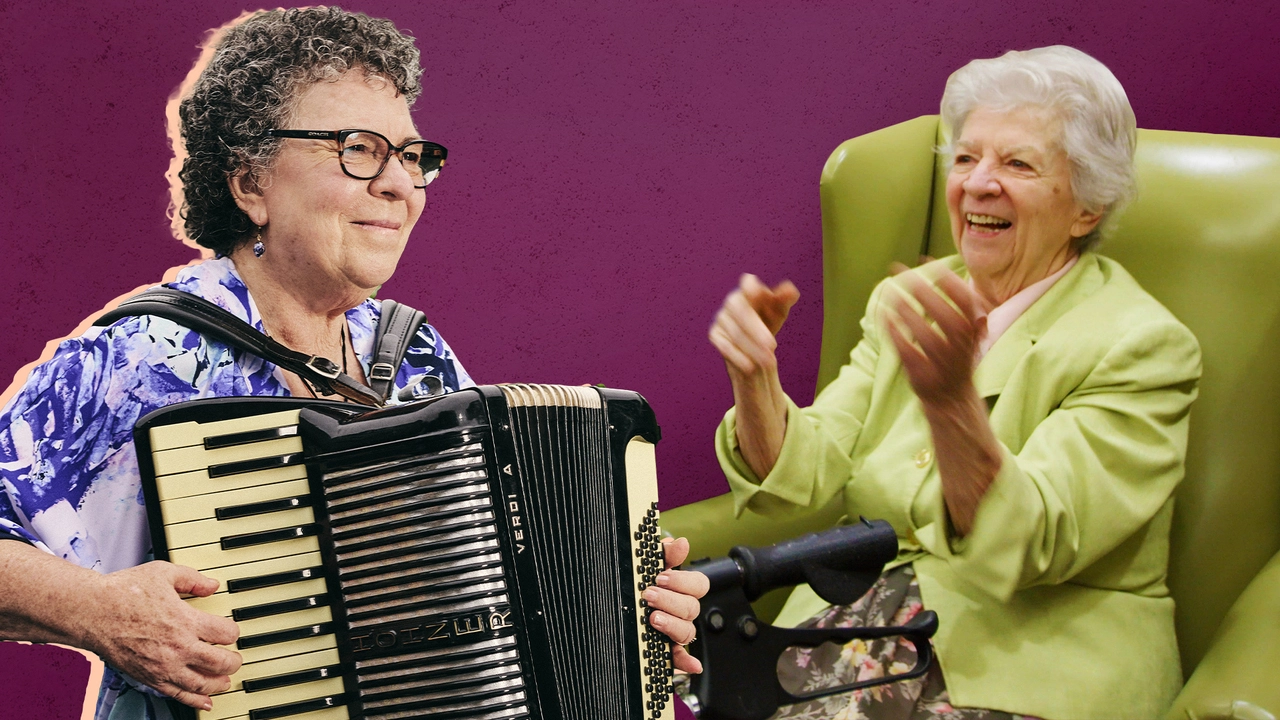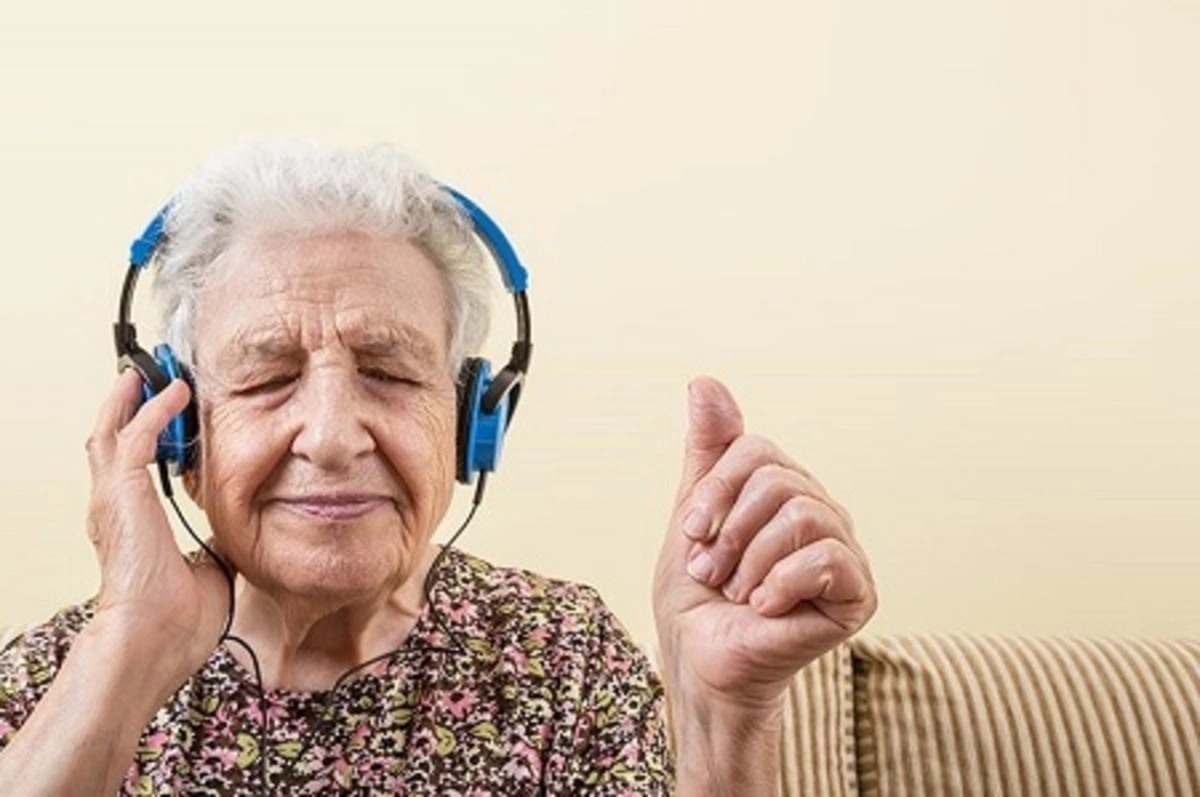
Music Therapy for Seniors: Benefits + How to Do
From the earliest days of human civilization, music and its power have been evident to us. Following World War II, a new psychological approach emerged called music therapy. Music therapy for seniors has garnered attention in recent years and has profound effects on the minds of older adults, especially those with dementia. Various types of music, with their wide-ranging benefits on stress reduction for elderly and applications in different situations, have a deep impact on the health of seniors. Regardless of age, ability, or interests, even without professional musical training, music has a way of creating wonderful emotions and memories in the listener.
These feelings and emotions often align with a person’s past experiences, creating a sense of comfort, satisfaction, and happiness. A caregiver simply needs to play a senior’s favorite song, and a familiar tune can instantly improve a bad mood or situation. Many older adults grapple with chronic and severe illnesses such as heart disease, cancer, diabetes, arthritis, and the like. Within this older population, they may face age-related conditions and challenges that affect their physical, emotional, and mental well-being.
Fortunately, the impact of music therapy, which involves using musical techniques to achieve therapeutic goals in a patient, has been proven for individuals of all ages and abilities, including seniors who require emotional security and health. This type of therapy, alongside traditional treatments, positive psychology, and even as an independent intervention, can accelerate the recovery process for older adults. In this blog post from humanhealthmag, we will explore what music therapy is and how it helps older adults, what the positive effects of music therapy for seniors are, the effect of music therapy on seniors with depression, and what its impact is on seniors with Alzheimer’s. Stay with us until the end.
Music Therapy for Seniors: Key Information
| Topic | Details |
| Treatment Method | Music Therapy |
| Impact on Seniors | Improves quality of life and mental well-being |
| Goals of Music Therapy | Enhancing communication, social, sensory, physical, cognitive, and emotional skills |
| Suitable For | Individuals with Alzheimer’s, depression, dementia, and motor disorders |
| Benefits of Music Therapy | Reducing symptoms of depression, improving sleep, and boosting mood |
| Key Methods | Singing along and songwriting |
| Important Considerations | Choosing the best method, consistent practice, and observing results |

What is Music Therapy?
To address the unique emotional, physical, cognitive, and social needs of older adults, music therapy utilizes specific therapeutic methods that include creating movement, singing, and listening to music. Through regular therapy sessions and its strategies, seniors can gain skills and therapeutic benefits from music therapy sessions and apply them to other areas of their lives.
Music therapy for seniors is an advanced and innovative method for improving Alzheimer’s disease. By utilizing the in-home nursing services for seniors provided by Salamat Aval Company, you can benefit from this novel approach to improve the well-being of your elderly loved one.
Previous research has shown that music therapy can contribute to the health and wellness of older adults in various areas, including physical rehabilitation, facilitating movement, increasing motivation, providing emotional support for patients and their loved ones, and creating a creative space for expressing their feelings and emotions.
How is Music Therapy for Seniors Conducted?
How to do music therapy for the elderly? The way music affects the brain is very complex. All aspects of music (including pitch, tempo, and melody) are processed by different areas of the brain. Various studies have shown us that using things like music therapy can improve neuroplasticity. This area affects the overall improvement of quality of life and strengthens our physical functions.
Music therapy for seniors has been proven to be effective in addressing symptoms and problematic areas for the aging population, such as physical, spiritual, emotional, and psychological needs. In short, music therapy is a clinical treatment plan between a therapist and a patient to achieve specific goals in improving life through music.
By stimulating cognitive function, patients have the opportunity to learn new skills and connect them with previously acquired knowledge. Music therapy activates short-term and long-term recall through exercises such as singing, dancing, using rhythmic instruments, and active musical engagement. For elderly patients with cognitive impairments like dementia, music therapy serves as a useful reality orientation exercise.
When music is played for patients with dementia that is associated with holidays, seasons, or a specific moment or event in their lives, they may perceive reality in a way that aligns with their needs, bringing them a sense of pleasure.

The Impact of Music Therapy on the Health of Seniors
The overall goal of music therapy is to achieve objectives that meet an individual’s needs. This goal may include, for example, improving motor function, social skills, emotions, coordination, self-expression, and personal growth. Each of these goals directly impacts the senior’s health. Common goals in music therapy include the development of:
- Communication skills, i.e. using sounds, vocal or verbal gestures
- Social skills, making eye contact, initiating interaction and improving self-esteem
- Sensory skills through touch, listening and levels of awareness
- Physical skills, including control and fine motor skills
- Cognitive skills, i.e. focusing, paying attention, imitating and sequencing
- Emotional skills, i.e. expressing emotions non-verbally
With the help of music therapy, it is possible to maintain the morale of seniors to fight serious illnesses and also improve their lifestyle. The impact of happiness in the lives of older adults should not be ignored, as it plays a significant role in their overall health.
Music Therapy for Seniors with Alzheimer’s
In the early stages of Alzheimer’s in seniors, many enjoy playing music or singing. Encourage seniors to continue participating in music. Music may be the very area where they can feel success and improvement and enjoy its beauty.

You can also use their favorite songs, which are often songs or music from their youth and middle age, and create compilations. Some older adults may have strong spiritual beliefs and find positive feelings with religious hymns. Our next topic in the field of music therapy for seniors is the relationship between this treatment method and severe depression.
Music Therapy for Seniors with Severe Depression
Studies show that music therapy can be helpful in improving severe depression and supporting elderly with depression. Individuals who undergo music therapy along with standard depression treatments (such as talk therapy) have a better recovery process compared to those who only receive standard treatment.
Listening to relaxing good night music for the elderly can also trigger the release of dopamine. Dopamine is a hormone that creates feelings of pleasure in individuals. Additionally, endorphins are produced when listening to music. Endorphins are the same hormones that can change a person’s mood and relieve pain.
Types of Music Therapy Methods for Seniors
Given the diverse abilities of older adults, a wide range of music therapy methods are available, from which all seniors can benefit. Below, we will specifically mention four of these methods:
Song Selection
Like anyone, many seniors find greater enjoyment in listening to music that belongs to their generation, and they are more likely to recall their favorite artists from their younger years. In the song selection exercise, patients can choose uplifting songs that help them reach a better state of mind and revive past experiences that evoke positive emotions.
Singing Along
Music therapy sessions for seniors may involve singing together or choral singing. It is best to use music therapist-provided song collections or the lyrics of popular songs for sing-alongs. Participants can sing their favorite songs or improvise with a new tune. Singing along encourages individuals’ participation in a fun and musical therapeutic process. This method can be used to achieve various goals and purposes, including teaching breathing exercises.
Songwriting
In this method, the therapist presents seniors with the lyrics of four or five different songs that have themes such as overcoming obstacles, support, or struggles with illness, etc. Then, the seniors are encouraged to spend some time reading these lyrics and select words from the given texts to create their own song.

Name That Song
A popular activity among seniors, their caregivers, and music therapists is naming songs based on short clips. This exercise allows seniors to search their minds for old favorite songs and reminisce about memories from different decades of their lives.
Benefits of Music Therapy in Nursing Homes
Various research indicates the effectiveness of music therapy as group activities for seniors in nursing homes for a wide range of therapeutic goals. Music therapy can be used to facilitate movement and overall physical rehabilitation, and to motivate seniors to cope with treatment. Music therapy can provide emotional support for seniors and their families and lead to better communication between seniors and nursing home staff.
Accredited music therapists can work with patients with acquired brain injury (ABI). For example, music therapy can be used to reduce the effects of dementia, decrease asthma episodes in children and adults, and help reduce pain in patients with poor health conditions.
Music therapy can also be used to help seniors with various disorders improve their communication abilities. Overall, music therapy appears to be a suitable option for helping individuals with Parkinson’s disease and improving motor function.
Important Considerations Regarding Music Therapy for Seniors
Although music therapy is not considered a definitive cure for any specific mental illness, it can be an effective and enjoyable tool for alleviating symptoms of numerous conditions, including depression and anxiety.
Music therapy offers a creative and accessible way for individuals to express emotions and process experiences. Humans have long used music for its powerful effects on mood and feelings. In addition to helping improve and enhance mental well-being in seniors, music therapy has several other benefits, such as providing a creative outlet, expanding knowledge, cultural awareness, and improving cognitive skills like memory and learning.
The use of music therapy in nursing homes should be supervised by specialists to ensure a proper therapeutic process. Generally, the most important points to consider in this regard are:
- Understanding music therapy strategies
- Choosing the best available strategy based on the circumstances
- Consistent music therapy exercises
- Observing the resulting outcomes
Concluding Remarks
Today, the use of music therapy to improve the conditions of various illnesses in seniors enjoys particular popularity. Many studies show a positive relationship between music therapy for seniors and the acceleration of patients’ recovery. It is worth noting that although music therapy is not a definitive and established treatment method, it can be said to be a very effective instrumental tool in the mental health of seniors.
We all know that if our seniors have good mental well-being, it will significantly impact the improvement of their quality of life and physical condition. You can use this method for the professional care and maintenance of the morale of your elderly family member.
Music therapy can be used in nursing homes to combat various diseases such as depression and Alzheimer’s by increasing the concentration and communication of seniors. One of the most important aspects of music therapy is the use of accredited and experienced therapists.

Frequently Asked Questions
What Are the Benefits of Music Therapy for Seniors?
Older adults, in particular, can benefit from listening to music as it gives them an outlet for creativity, socialization, and mental stimulation. Music therapy has even become a kind of effective treatment program for older adults with Alzheimer’s disease.
What Is the Age Range for Music Therapy?
Music therapy helps people of all ages (children, adolescents, and adults) and from all walks of life. It may be beneficial for many different aspects, such as your mental and emotional well-being.
How Does Music Therapy Help Reduce Anxiety in Seniors?
Numerous studies indicate that music therapy can reduce feelings of anxiety in older adults, including those with cancer, individuals undergoing surgery, and those admitted to intensive care units. Music can lower blood pressure and heart rate, directly impacting the reduction of an individual’s stress levels. Furthermore, evidence suggests that individuals who undergo music therapy experience a decrease in anxiety immediately following the sessions.
